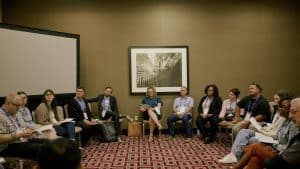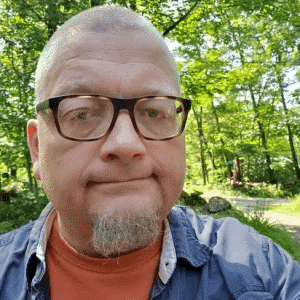Models for Changing Mindsets
CompetencyWorks Blog

This post about changing mindsets is part of our Aurora Institute Symposium 2024 series sharing ideas from #Aurora24 sessions.
The variety and scope of work being done in competency-based, student-led learning was on full display at #Aurora24, and what struck me as amazing was how many common threads ran through the sessions. One of those threads was wound around mindsets.
The status quo mindsets, despite the progress we’ve made and our excellent work as a community, seem to be as devilishly strong as ever. In other words, we are doing great work for change, but in many localities and within our larger systems “the way we’ve always done things” has hung on tenaciously. One might be tempted to say, “We’re not doing enough.” But our “stuckness” may not be a function of effort. It may be there’s a strategy we can take to move forward. Let’s unpack this and consider new possibilities.
What changes mindsets in the “real” world?
A logical approach to mindset change might say, “if we frame a better argument, or craft a better professional development session, or plot out a better long term implementation, then mindsets will shift and behaviors will change.” In other words, “if we give people more information, either quantitative or qualitative, data or stories, then people will realize the right way to do things and will do them.”
But that’s not what works with large scale change. It might work with those of us who already see the value of the work we’re doing, but not for the citizen on the street or on the school board. There’s a lot of writing out there about changing individual mindsets, and some about changing the mindset of an organization (usually a business, here’s what Forbes has to say).
Talking about changing the mindset of an organization implies that there is a unity of purpose in the culture. Many parts of our society—religion, for example, which I’ll say more about in a minute—are very good at the creation of community through messaging that unifies and inspires us. This is something that we—educational changemakers—have been improving in, but could get better at. Chris Sturgis in her recent piece here on CompetencyWorks has this to say:
So, here’s my question: What kind of unifying message could we all rally around? Something that, when parents, educators, and policymakers hear it, they instantly know it’s about fostering the joy of learning and growing great thinkers and problem-solvers. The Reinventing Schools Coalition used the motto, ‘Doing What’s Best for Kids,’ a phrase you’d hear in every school following their model. Sydney Schaef and I are working on a book using ‘Let’s Get ReaL’ – a nod to the REsearch About Learning. Let’s get creative! I’m sure together we can brainstorm a few slogans that say, loud and clear, you’re on the team that’s Lighting the Love of Learning.
Chris’s talk about mottos and slogans may sound like “suggestions from marketing,” but the idea of using short, memorable ideas and phrases to capture important messages—parables, slogans, or aphorisms—has a deep foundation in behavioral, communication, and marketing science.
New metaphors create new possibilities.
Gareth Morgan in his classic Images of Organizations (2006) argued that mindsets change when we change the metaphor we use to understand our organizations. If you think of a school as a factory, for example, there are different possibilities and explanations for events than if you think of school as a garden. Thinking of school as an organism (it’s got a head, it draws in resources—eats, and expels waste) will lead to a different mindset than if you think of school as a prison (as some kids experience it).
As an experiment, instead of building up from theory to action (i.e., how should mindsets change) let’s ask ourselves: where in our society do mindset changes genuinely occur? I can think of four domains within which mindsets change reliably: fear, art, religion, and recovery groups. Is there something we can learn from these? Let’s look at a couple of these as a metaphor by which we can understand mindset change.

Can we tap into a higher purpose?
We mentioned religion. It’s a touchy subject in education for all sorts of good reasons, but I’m not arguing that we adopt any religious ideas, only that we learn from their way of crafting mindsets. Teachers and pastoral care providers often perform analogous functions. Schools and religious institutions (should) operate in the field of values, ethics, caring, and belonging. When we’re teaching something kids ought to know, we’re also talking about why they ought to know it—in other words, advocacy of right versus wrong. The fact that the right thing to do may be inefficient should never be an argument against doing the right thing—and anyway, the more we do the right thing, the more efficient we’ll get at doing it, which is far better than being efficient at doing the wrong thing.
Public education’s purpose includes preparing students for career and civic life, but it also can aspire to enable learning that leads to a thriving life. Learning has something both intimate and transcendent about it. Teaching, the shaping of a person, has an inherent spiritual dimension. Henry Adams wrote, “A teacher affects eternity.” The opening chapter of Teaching 101, titled “Why Does Teaching Matter?” makes exactly this point in a succinct four pages. Yes, it is important that education be useful, but the utility of education will only result in begrudging, lukewarm support for our schools. Schools do amazing, miraculous-feeling things in the development of adult humans! We can celebrate that.
Is shifting mindsets a matter of recovery?
The idea of looking to recovery groups as a metaphor for shifting mindsets arose in a conversation I participated in at #Aurora24. Then someone recommended bell hooks, all about love (2001), which forces you to consider that a society reforming is a society healing. Is it fair to say that Western society—and its schools—is addicted to control, hierarchy, radical individualism, and oppressive tribalism? And that this addiction harms untold numbers of students in society’s schools? hooks argues that to counter this we need “healthy interdependency.” Schools need to heal from “the way we’ve always done things,” and none of us can do this alone. hooks writes,
[n]o organization dedicated to healing demonstrates this principle more than Alcoholics Anonymous. The millions of people who attend AA meetings seek a place of recovery and find that affirming community that surrounds them creates an environment of healing. The community offers to individuals, some for the first time ever in their lives, a taste of that acceptance, care, knowledge, and responsibility that is love in action. Rarely, if ever, are any of us healed in isolation.
These may feel like a stretch to veteran educators, leaders, and social reformers, some of whom feel uncomfortable even using the word “love” in this context. But consider our embracing of the importance of belonging as a necessary quality within ecosystems.
Twelve-step groups have had a profound impact on the mindset of our society as it relates to addiction and its role in a person’s life. AA went from two people in a hospital to millions over the world. How did a non-profit that eschews promotion do that? How can we, as education reformers, do that? At the very least, how can we learn from this model of shifting mindsets?
Let’s experiment.
I feel a sense of urgency. My feeling that we have to try some new things is strong. Metaphors, stories, and rhetoric are in my wheelhouse and my idea of a good time. My argument is that we’ve been using the same models, metaphors, and rhetorical practices for decades with diminishing returns—let’s try something different.
Let’s start some experiments, exploring the possibilities of framing change and the metaphors we live by. I suggest we experiment this year, within our schools and communities, spreading the word to the status quo, and then come to the Aurora Symposium 2025 to compare notes. Be extravagant with your metaphors. We will meet you in New Orleans.
Learn More
- Full Steam Ahead…Together: A Shared Tagline for the CBE Community
- How to Have a Conversation About Transformational Leadership
- Competency-Based Education: Moving Forward with Purpose
 Gary Chapin is the co-author of 126 Falsehoods We Believe About Education (2021). He is an advocate and supporter of equity-based practices in schools such as competency-based learning, performance assessment, adaptive leadership, and collaborative cultures. Gary works with Educating for Good, The Essex County Learning Community, the Massachusetts Consortium for Innovative Education Assessment (MCIEA), as well as school districts across the United States.
Gary Chapin is the co-author of 126 Falsehoods We Believe About Education (2021). He is an advocate and supporter of equity-based practices in schools such as competency-based learning, performance assessment, adaptive leadership, and collaborative cultures. Gary works with Educating for Good, The Essex County Learning Community, the Massachusetts Consortium for Innovative Education Assessment (MCIEA), as well as school districts across the United States.